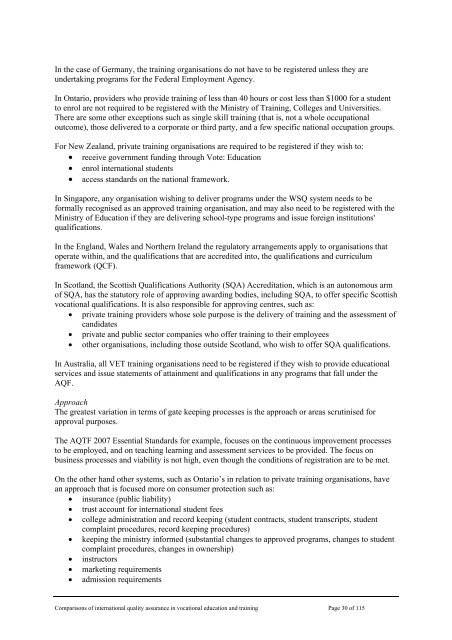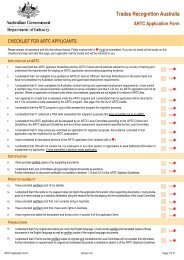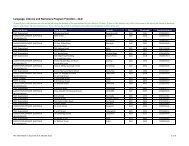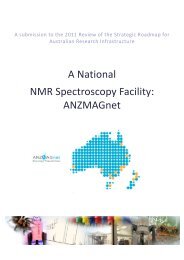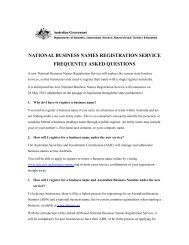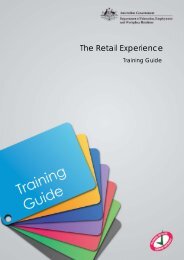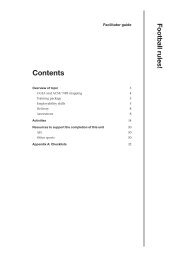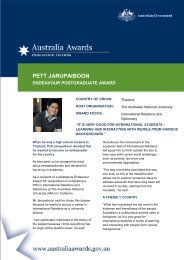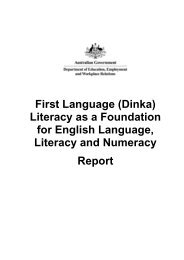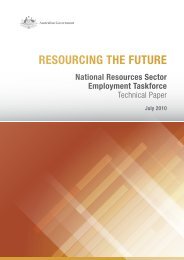Review - Department of Innovation, Industry, Science and Research
Review - Department of Innovation, Industry, Science and Research
Review - Department of Innovation, Industry, Science and Research
You also want an ePaper? Increase the reach of your titles
YUMPU automatically turns print PDFs into web optimized ePapers that Google loves.
In the case <strong>of</strong> Germany, the training organisations do not have to be registered unless they are<br />
undertaking programs for the Federal Employment Agency.<br />
In Ontario, providers who provide training <strong>of</strong> less than 40 hours or cost less than $1000 for a student<br />
to enrol are not required to be registered with the Ministry <strong>of</strong> Training, Colleges <strong>and</strong> Universities.<br />
There are some other exceptions such as single skill training (that is, not a whole occupational<br />
outcome), those delivered to a corporate or third party, <strong>and</strong> a few specific national occupation groups.<br />
For New Zeal<strong>and</strong>, private training organisations are required to be registered if they wish to:<br />
• receive government funding through Vote: Education<br />
• enrol international students<br />
• access st<strong>and</strong>ards on the national framework.<br />
In Singapore, any organisation wishing to deliver programs under the WSQ system needs to be<br />
formally recognised as an approved training organisation, <strong>and</strong> may also need to be registered with the<br />
Ministry <strong>of</strong> Education if they are delivering school-type programs <strong>and</strong> issue foreign institutions'<br />
qualifications.<br />
In the Engl<strong>and</strong>, Wales <strong>and</strong> Northern Irel<strong>and</strong> the regulatory arrangements apply to organisations that<br />
operate within, <strong>and</strong> the qualifications that are accredited into, the qualifications <strong>and</strong> curriculum<br />
framework (QCF).<br />
In Scotl<strong>and</strong>, the Scottish Qualifications Authority (SQA) Accreditation, which is an autonomous arm<br />
<strong>of</strong> SQA, has the statutory role <strong>of</strong> approving awarding bodies, including SQA, to <strong>of</strong>fer specific Scottish<br />
vocational qualifications. It is also responsible for approving centres, such as:<br />
• private training providers whose sole purpose is the delivery <strong>of</strong> training <strong>and</strong> the assessment <strong>of</strong><br />
c<strong>and</strong>idates<br />
• private <strong>and</strong> public sector companies who <strong>of</strong>fer training to their employees<br />
• other organisations, including those outside Scotl<strong>and</strong>, who wish to <strong>of</strong>fer SQA qualifications.<br />
In Australia, all VET training organisations need to be registered if they wish to provide educational<br />
services <strong>and</strong> issue statements <strong>of</strong> attainment <strong>and</strong> qualifications in any programs that fall under the<br />
AQF.<br />
Approach<br />
The greatest variation in terms <strong>of</strong> gate keeping processes is the approach or areas scrutinised for<br />
approval purposes.<br />
The AQTF 2007 Essential St<strong>and</strong>ards for example, focuses on the continuous improvement processes<br />
to be employed, <strong>and</strong> on teaching learning <strong>and</strong> assessment services to be provided. The focus on<br />
business processes <strong>and</strong> viability is not high, even though the conditions <strong>of</strong> registration are to be met.<br />
On the other h<strong>and</strong> other systems, such as Ontario’s in relation to private training organisations, have<br />
an approach that is focused more on consumer protection such as:<br />
• insurance (public liability)<br />
• trust account for international student fees<br />
• college administration <strong>and</strong> record keeping (student contracts, student transcripts, student<br />
complaint procedures, record keeping procedures)<br />
• keeping the ministry informed (substantial changes to approved programs, changes to student<br />
complaint procedures, changes in ownership)<br />
• instructors<br />
• marketing requirements<br />
• admission requirements<br />
Comparisons <strong>of</strong> international quality assurance in vocational education <strong>and</strong> training Page 30 <strong>of</strong> 115


